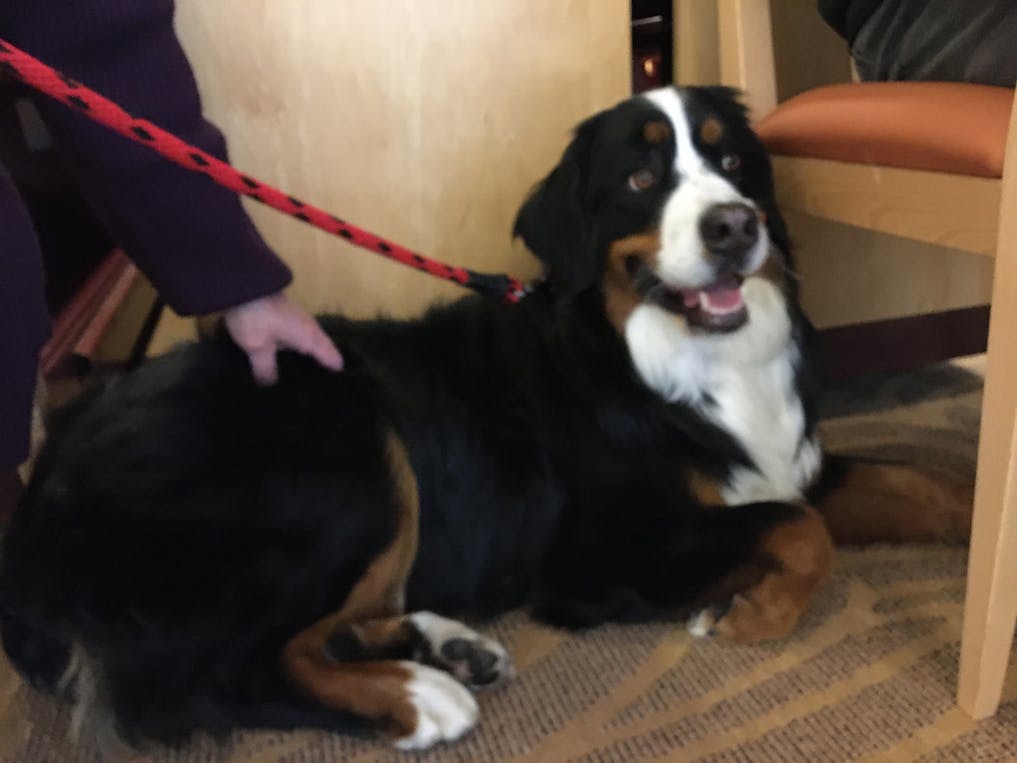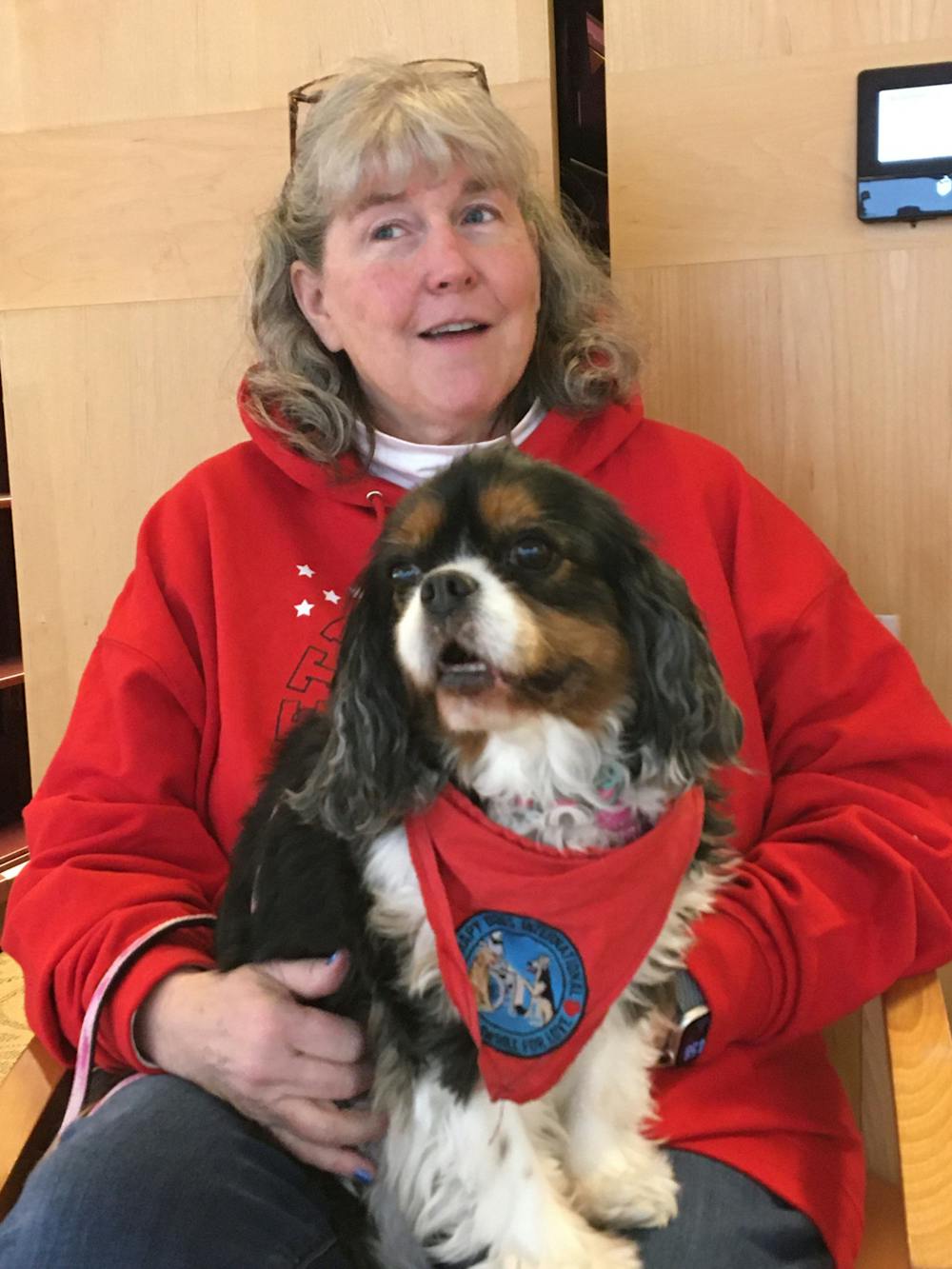CMU to allow service animals in training access public places
CMU adopts a new service animal policy to reflect state law
Central Michigan University has updated its service animals policy to reflect new Michigan law. Now service animals in training will be allowed to access public spaces, said Ann Krzyzaniak, assistant director of Student Disability Services.
"It's more access for folks who are in the process of training their animal," Krzyzaniak said. "That wasn't covered before so they would not be allowed on campus while in training without special permission. And now the law covers that."
Registered service animal vs emotional support animals
There are two types of campus animals that one might have: registered service animals, also called assistance animals, and emotional support animals. However, they are not the same thing.
Service animals are animals trained to assist people with disabilities with daily activities, according to CMU.
Elle Hacker, a member of Central Paws on campus, said that people aren't allowed to discriminate against registered service animals, either. Unlike an emotional support animal, a registered service animal cannot be removed from its owner’s side. Registered service animals are allowed to enter any building as required by law.
Service or assistance animals are defined as a category of animals that may work, provide assistance or perform physical tasks for an individual with a disability and/or provide necessary emotional support to an individual with a mental or psychiatric disability the website read.
These are not considered service animals under The Americans with Disabilities Act Amendments Act.
Because of the Americans with Disabilities Act (ADA) and the Michigan Persons with Disabilities Civil Rights Act, service animals are allowed to accompany students with disabilities on campus.
Director of Student Disability Services Michelle Veith works to provide resources and assistance to students with disabilities on campus.
"(Assistance animals are) like comfort, they provide companionship, they help with anxiety and depression just by their mere presence, which is very different than going through specialty training to serve specific tasks," Veith said.
Both Veith and Krzyzaniak said they have seen an increase of animals on campus. Majority of those are assistance animals.

How to register an animal on campus?
To register a service animal on campus, Veith said the student first needs to spent two weeks with the animal and a parent on campus to see if they were a match.
This training happens when classes are not in session. The school makes arrangements for a student to go through buildings with the animals and train.
"The training involved for a service dog ... is really pretty remarkable and quite intensive," Veith said.
Hacker also gave this advice for those interested in having an emotional support animal on campus:
- Apply using the CMU paperwork. Explain how an emotional support animal (ESA) would be beneficial to mental health or overall well-being in the request. To prove that the animal will benefit the student, reach out to a physician, psychologist or therapist.
- After CMU reviews the paperwork, it has to make sure the animal is healthy. They require proof of certain vaccinations so the animal is not a threat to people's health.
- Set a meeting with a Residence Housing Director (RHD), to discuss expectations of what is and isn't allowed.
The rules are different by apartment and state, Hacker said.
“You take full responsibility for any damage or if someone gets hurt; say your dog bites someone,” Hacker said.
Experiences with other animals on campus
Hacker and her friend, senior Megan Kassuba, have been members of Central Paws for three years. It's an RSO on campus for pet-lovers, with the motto "we speak for those who cannot," they said.
The group's goal is to educate people about pet safety and to support shelter animals in the community through efforts for the Humane Animal Treatment Society (HATS) and Karma Kat Cafe.
Kassuba said that what drew her in was taking the animals from HATS on walks. Sometimes Central Paws volunteers at Karma Kat Cafe, which can have up to 30 cats.
Sometimes, when Central Paws members walk dogs from HATS in the cold, Hacker said they will take them inside the first set of doors of the Education and Human Services Building to warm up. It's more difficult to take an animal all the way into a building, unless it's a service animal.
Hacker said access to buildings with animals depends on whether you have prior permission. She said this is especially true because it's a shelter animal. She said that for safety, the animal can’t contact other dogs and small kids up close. Another concern is allergies.
In the past, she said they met in a room without any cloth chairs that might catch cat hair.
“So the kitty was allowed to come to the meeting,” Hacker said. “With permission we can sometimes take animals in. We have had animals come in once every few meetings.”
Hacker said they request permission from Central Paws' faculty advisor Stacey Pattinson before they can bring an animal to a meeting.
Other animals that you might meet on campus are the therapy dogs. They organize in Mount Pleasant and meet in the University Center or Park Library every other Friday with permission from campus.
Glory, the therapy dog of Jean Zabik, couldn't sit still Friday Nov. 1, according to her owner.
"I’ve had her since she was a pup," Zabik said.
Zabik said she wanted to test sooner to make the Cavalier King Charles Spaniel a therapy dog, but was delayed by COVID. Before Glory became a therapy dog, she was in agility training. The dogs will be in the library Friday 5-7 p.m. during finals but not in the morning this year.
“It’s just tragic because we know there’s people who like to see us during the day,” Zabik said. “There are some people who don’t say a word but you can just see the stress leave as they pet the dog."
Student can expect more paws on campus, and they can participate. Central Paws meets on Tuesdays and might bring in therapy dogs one week, they said. Around 10 a.m. some Saturdays, the RSO hosts Pack Walks with dogs from HATS animal shelter. Students are also welcome to meet Glory and her fellow therapy dogs at the library the Friday before Finals.





